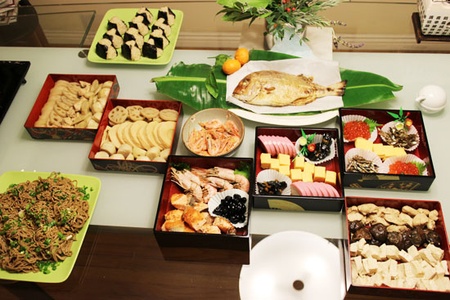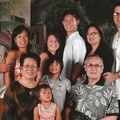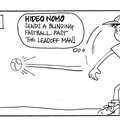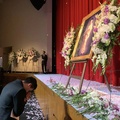A little belated, but shinnen akemashite omedeto! Of course, here in the JA community, January 1 is only the beginning of the New Year’s season, with many community organizations hosting shinnenkai parties that will keep folks busy well into next month and beyond.
For New Year’s Day we went to Eric’s cousins’ home in San Gabriel and enjoyed a feast of nishime, accompanied by toasts of warm sake. This unseasonably warm winter we’ve been experiencing didn’t change my yearning for the traditional Japanese New Year’s foods like ozoni, soba, and kazunoko.
Coming back to Rafu the next day, we all compared our Oshogatsu meals. Most impressive was Ichiro, who did the planning, preparation, and cooking for his family’s feast. A good suggestion by staff for next New Year’s edition is to ask readers to share some of their favorite Oshogatsu recipes.
With so many of us relying on our aging moms, obachans, and aunties to prepare all of this food, it’d be nice to share how these dishes are made, so they can be enjoyed for years to come.

A New Year’s feast prepared by Ichiro Shimizu. Among the dishes are baked red snapper, nishime vegetables, tazukuri (dried sardines), soba noodles, kuromame and musubi.
* * * * *
At the beginning of a new year, we make resolutions and vow to change something about ourselves for the better. Then once the year winds down, we see that things are pretty much the same: our waists are may be a little thicker, the house is still cluttered, that stack of old photos is still there.
Personally 2013 was a year of change, as we’ve moved into a new phase of our lives as husband and wife. Nearly a year in, I’d say that marriage doesn’t really change things as much as if we were expecting a baby. (We’re not.) It’s been more a subtle adaptation of schedules and priorities. Who is doing the laundry, what are we having for dinner?
My parents, like many Nisei, married in their twenties and before they were in their thirties, were already coping with a full house of kids, a mortgage, and careers.
One thing I haven’t changed is my last name. I’m happy with being called Mrs. Hayashi, but I haven’t taken the steps to legally change it. One reason is just the hassle of having to file all the necessary documents, and once you’ve reached a certain age, those become substantial.
The other has more to do with my own sense of my identity. Most female writers I know haven’t changed their names. I think it has to do with our professional identities that are tied into our bylines.
There is also the option to hyphenate, but with a long Japanese name, I think adding another name would become impractical. My mom went through several names through her life, and it didn’t seem to bother her. Maybe it’s a generational thing.
In Japan when you marry, you are taken out of your father’s registry (koseki) and placed into your husband’s registry. So in those terms, I guess I am no longer a Muranaka already.
When I was doing some research on our family history, I found that while I could trace our lineage through our paternal grandfather’s side, my grandmother’s ancestors were unknown. Since she passed away long ago, those names are lost to time.
For now, Eric doesn’t mind, so I’ll be Muranaka at least for the time being.
* * * * *
Although so much is basically the same, it is profound the changes that come after joining together in marriage—things that I didn’t expect.
I am so much more aware now that we are now halves of one whole and that I no longer do things for just myself.
I know that there is this backbone of strength in our relationship that keeps me going despite the challenges. It’s been a blessing when times have been difficult, and I hope it’s there as the years go by. It’s corny, but love—of family, friends, and our community—does make us stronger.
As it says in Corinthians: “love is patient, love is kind.” Those are the words I take with me into this brand new year.
*The article was originally published in The Rafu Shimpo on January 9, 2014.
© 2014 The Rafu Shimpo; Gwen Muranaka





